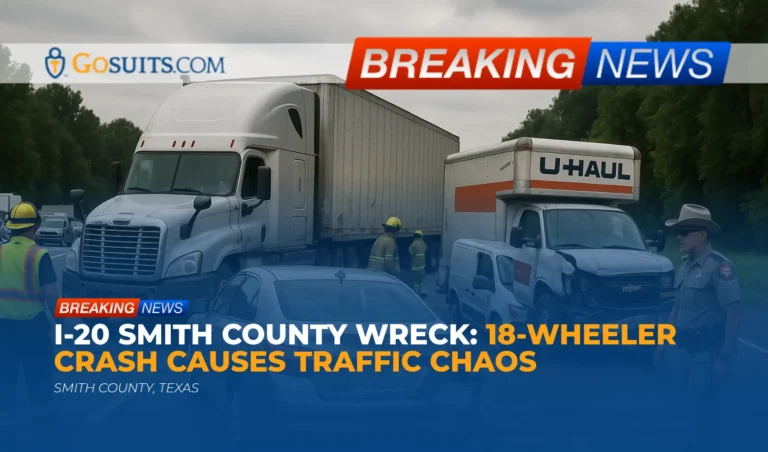A major traffic incident occurred on Interstate 20 (I-20) in Smith County, Texas, on July 23, 2025, involving an 18-wheeler, a U-Haul, and another passenger vehicle. The collision, reported near mile marker 567, resulted in the 18-wheeler blocking the westbound lanes of the interstate, causing extensive traffic backups and diversions.
Incident Details
According to Smith County Sheriff’s Office spokesperson Larry Christian, the wreck was first reported around 1 p.m. The collision prompted immediate response from multiple agencies, including the Texas Department of Public Safety (DPS). Authorities diverted traffic onto State Highway 155, which led to further congestion extending to U.S. Highway 271.
As of the initial reports, no injuries were reported. However, the focus remained on clearing the scene and managing the substantial traffic disruption caused by the blocked westbound lanes of I-20.
Immediate Aftermath and Response
The presence of a large commercial vehicle like an 18-wheeler in an accident often presents additional challenges due to the size and weight of the vehicle, as well as the potential for significant cargo spillage. Emergency responders prioritized securing the scene to prevent further incidents and began the process of assessing the wreckage and planning for its removal.
The diversion of traffic onto alternate routes, while necessary, compounded traffic issues in the surrounding areas. Motorists were strongly advised to avoid the area if possible and to seek alternate routes until the scene could be cleared and normal traffic flow restored. The incident underscores the potential for major disruptions on key transportation corridors when large vehicle accidents occur.

Legal and Safety Implications of Multi-Vehicle Accidents Involving Commercial Vehicles
Multi-vehicle accidents involving 18-wheelers or other large commercial vehicles raise complex legal and safety considerations. Given their size and weight, 18-wheelers can cause catastrophic damage and injuries in a collision. Determining liability in such cases often requires a thorough investigation into the circumstances leading up to the accident.
Several factors can contribute to accidents involving large trucks, including driver fatigue, speeding, distracted driving, improper cargo loading, inadequate vehicle maintenance, and traffic congestion. Federal and state regulations govern the operation of commercial vehicles, including hours-of-service rules for drivers, vehicle inspection requirements, and weight restrictions. Violations of these regulations can be critical in establishing negligence in the event of an accident.
In a multi-vehicle collision, the determination of fault can be complex. It may involve assessing the actions of multiple drivers, reviewing police reports, examining vehicle data recorders (black boxes), consulting with accident reconstruction experts, and gathering witness statements. Each driver’s actions leading up to the crash, including speed, following distance, lane changes, and attention to the road, are scrutinized.
Potential Liability and Legal Recourse in Multi-Vehicle Accidents
Establishing liability in a multi-vehicle accident is crucial for victims seeking compensation for their injuries and losses. Depending on the circumstances, potentially liable parties may include:
- The truck driver: If the driver’s negligence, such as speeding, distracted driving, or violating traffic laws, contributed to the crash, they may be held liable.
- The trucking company: Trucking companies have a responsibility to ensure their drivers are properly trained, licensed, and compliant with safety regulations. They may also be liable for negligent hiring practices, inadequate vehicle maintenance, or failing to monitor driver performance.
- Other drivers: If the actions of drivers of the other vehicles involved contributed to the accident, they may also share liability.
- Vehicle manufacturers: In some cases, a defect in the design or manufacture of a vehicle may contribute to an accident.
- Cargo loaders: Improper loading of cargo can lead to instability and accidents.
- Maintenance providers: Negligence in maintaining the truck could also lead to liability.
In Texas, as in many states, the legal principle of comparative negligence may apply in multi-vehicle accident cases. This means that even if a victim is partially at fault for the accident, they may still be able to recover damages, although their recovery may be reduced in proportion to their degree of fault.
Damages that may be recoverable in a personal injury claim resulting from a multi-vehicle accident can include:
- Medical expenses (past and future)
- Lost wages (past and future)
- Property damage
- Pain and suffering
- Emotional distress
- Disability
- Disfigurement

Commentary from Gosuits Smith County, Texas Personal Injury Attorney
Accidents involving 18-wheelers and multiple vehicles can result in significant injuries and financial losses for those involved. Investigating these incidents requires a comprehensive approach to determine the factors that contributed to the collision and identify all potentially liable parties. Victims of such accidents have the right to seek compensation for their damages, and a seasoned personal injury attorney can play a crucial role in navigating the legal process, protecting their rights, and pursuing a fair and just resolution. Understanding the complexities of state and federal regulations governing commercial vehicles is essential in these cases. An attorney experienced in handling truck accident claims can provide valuable guidance and advocacy.






